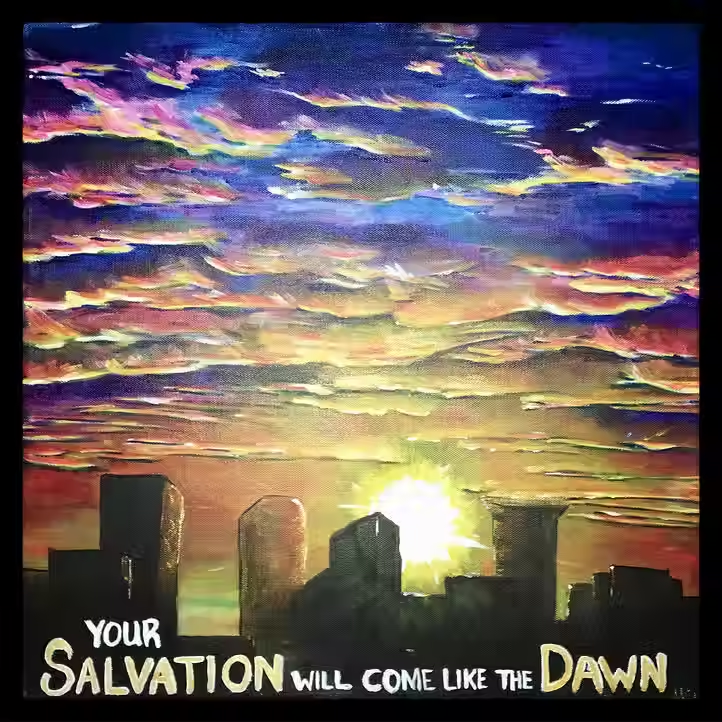Turnip Greens and John 3:16
- Anna George Traynham

- Mar 10, 2024
- 4 min read
A Lent Reflection for Sunday, March 10 by Rev. Anna George Traynham
Lectionary reading for 03/10/2024: Numbers 21:4-9 • Psalm 107:1-3, 17-22 • Ephesians 2:1-10 • John 3:14-21
Selected passage for reflection: John 3:14-21
Read
John 3:14-21 NRSV
14 And just as Moses lifted up the serpent in the wilderness, so must the Son of Man be lifted up, 15 that whoever believes in him may have eternal life.[a]
16 “For God so loved the world that he gave his only Son, so that everyone who believes in him may not perish but may have eternal life.
17 “Indeed, God did not send the Son into the world to condemn the world but in order that the world might be saved through him. 18 Those who believe in him are not condemned, but those who do not believe are condemned already because they have not believed in the name of the only Son of God. 19 And this is the judgment, that the light has come into the world, and people loved darkness rather than light because their deeds were evil. 20 For all who do evil hate the light and do not come to the light, so that their deeds may not be exposed. 21 But those who do what is true come to the light, so that it may be clearly seen that their deeds have been done in God.”[b]
Reflect
No one has a neutral opinion about turnip greens. You either love them or you hate them, and whether you love them or hate them has a lot to do with your experience of them. Turnip greens are a little bitter, but not in a bad way; it just depends on how you season them. They’re tricky to clean, too. If you’ve ever grown turnips, you know that their leaves are a favorite home for pests. You have to turn the leaves over and over as you scrub them, or you may find a bug on your plate. Turnip greens are complicated. They’re polarizing. They come with baggage.
They’re a lot like John 3:16.
“For God so loved the world that he gave his only begotten son…”
It’s the most memorized verse in the New Testament. Some of us might love John 3:16.
We might have grown up on it, and have positive memories attached to it. Sure, it’s a little bitter, but we know how to season it with just the right amount of butter and sop it up with cornbread. Others of us would never order John 3:16 off a menu. We’ve got bad memories of someone trying to force feed it to us, or of watching a worm crawl out between its leaves.
Whether positive or negative, we’ve got baggage around John 3:16. What we don’t have is context.
That’s what we get in today’s lectionary reading. We get to zoom out and see the whole plate.
Today’s passage is just one part of Jesus’s conversation with Nicodemus, the Pharisee who comes to him in the darkness of night, not yet ready to profess his faith in the light of day.
Jesus tells him that through the spirit believers will be born from above, and Nicodemus asks, “How can this be?” That’s the question Jesus is answering in our scripture today.
He’s not answering a question about heaven or hell, about eternal damnation or even personal salvation. He’s answering the question, “How can this be?”
How can it be that we can be born of the spirit?
How can it be that what seems impossible is possible?
And Jesus answers, “Love.”
That’s the bottom line of this text: God loves the world, and God showed that love to us by lifting up Jesus in the most humble of ways. God loves the world enough to want life for us: not just everlasting life beyond death but full and faithful life right now, on this side of the grave.
That might be the trickiest part of this passage: the leaf that has to be scrubbed the most, because it has definitely come to house some unsightly parasites. (Turnip greens are good for you, but the bugs who hang out in them are not.)
There is a lot of language in this passage about perishing and condemnation, and on the other hand everlasting life and light. Our whole lives, many of us have been told that this passage is about what happens when we die. Even if you never heard that in Sunday school or in a sermon, you probably absorbed it from billboards or church signs. Evangelists though the centuries have watered down this passage so much that it’s lost all its flavor. More often than not, all we taste is a threat. “Believe in Jesus or else.”
Beloved, hear this good news. There is no threat in or around John 3:16.There is only a promise.
“How can this be?” Nicodemus asked, and Jesus answered, “Love.”
Respond
If you have your own baggage around this passage, what would it be like for you to set it down and trust that God loves you?
What wonders of your life leave you asking, “How can this be?”
Rest
God of grace, we give you thanks for your love incarnate:
Your love poured out;
Your love that surrounds us;
Your love that will not let us go.
Amen.
About the Author

Rev. Anna George Traynham serves as Senior Pastor of Shallowford Presbyterian Church (PCUSA), in Atlanta, Georgia.





Comments